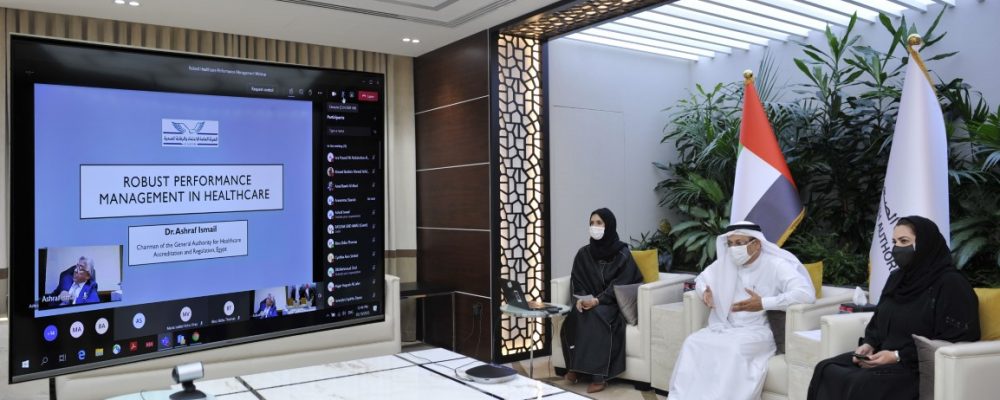The Dubai Health Authority, DHA, organised a webinar titled “Robust performance management in healthcare”, which was delivered by Dr. Ashraf Ismail, Chairman of the General Authority for Healthcare Accreditation and Regulation, Egypt, and former Managing Director of JCI, Middle East.
The webinar was virtually attended by Humaid Al Qutami, Director-General of the DHA, in addition to Fatima Abbas, the CEO of Strategy and Corporate Development at the DHA and more than 100 specialists working in the healthcare sector.
The webinar discussed the Egyptian experience in creating robust performance management through policies, strategies and techniques used to consistently achieve the desired optimum outcomes.
Dr. Ismail highlighted that the optimum outcome of any national healthcare system is to maintain the physical, social and psychological well-being of all people by providing the right services for the right people at the right time and safely providing these services through the best utilisation of resources to achieve the best customer experience.
He added that to achieve these outcomes, resources must be optimally utilised to achieve 100 percent efficiency and with zero waste, providing the safest care to achieve zero preventable harm, providing the best patient experience to achieve 100 percent satisfaction and acceptability to the patient and implementing best practices to achieve maximum effectiveness.
Dr. Ismail also discussed the regulatory pillar, adding that the regulatory pillar of any healthcare system should focus on ensuring the sustainability of optimal performance rather than focusing on capturing errors. He also discussed the care delivery pillar where he added that delivery care processes must be integrated rather than fragmented across the continuum of care and that financial viability is essential to have a consistent and sustainable healthcare system.
He also shared the components needed to deliver the best care services which include infrastructure, organisational design and flow, clinical and administrative systems, information management and technology, advanced diagnostic and interventional technologies, human resources management, clinical governance and leadership structure.
At the end of the webinar, Al Qutami thanked Dr. Ismail for his presentation and stressed the importance of exchanging international best practices and experiences with prominent healthcare professionals.
He also stressed the importance of the webinar which focused on comprehensive and integrated development of the healthcare system.
He added that the development strategy implemented by the authority, including its projects, programmes and initiatives, is based on serving people, meeting the growing requirements for high-quality healthcare services.




